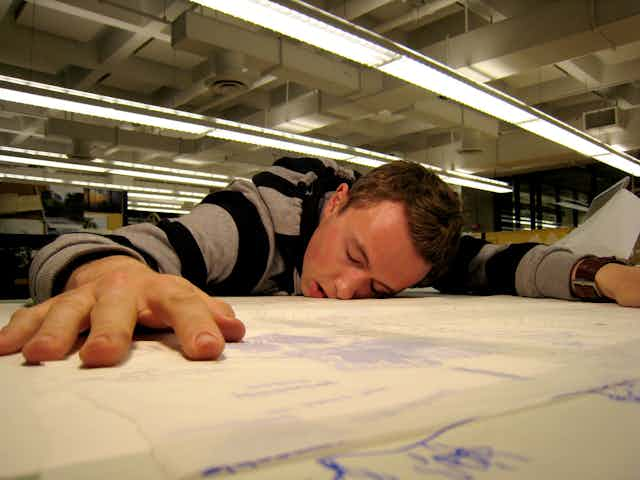Even though most Australians know we need to exercise more, many of us don’t. Our recent study suggests this is often due to diminishing availability of time.
We found that among otherwise healthy people, becoming time poor, rushing or feeling time pressed increases new cases of extreme inactivity – exercising less than 30 minutes a week – one to two years later. This occurred for around 5% of our study population.
Decreasing income exacerbated inactivity due to rising time pressure. In people who became both time and income poor, one in five of them became extremely inactive.
Lack of time also changed what healthy people ate. They increased the number of times they ate out, ate less fresh fruit and vegetables and more foods high in fats, salt or sugar.
Our study participants were 6,000 Australians aged 25-54 whom we followed for three years. We included only people who were healthy – both in terms of their physical and mental health and wellbeing – and people who were not time or income poor in the first year of the study.
We defined “time poor” as when at least 70 hours a week were spent on some or all of the following: working, caring, running a household and commuting. The term “time pressed” referred to the feeling of rushing (often or always) in order to manage.
Barriers to healthy living
Right now 9 million Australians don’t do enough exercise. This inactivity will cost the taxpayer $1.5 billion in health care through lifelong consequences, including increased risk of obesity, type 2 diabetes and heart disease, as well as depression, anxiety and some cancers. This is a problem that costs everyone.
While public health research and initiatives do seriously consider how lack of knowledge and lack of income affect people’s health, most are yet to address the complexities of time availability. Instead, lack of time is still viewed as an excuse: a problem of laziness, of poor choices and of low motivation.
Our results suggest that rather than being an excuse, lack of time and other factors create barriers to healthy living.
Working, care-giving and disabilities create time pressures
Lack of time is sometimes perceived to be a problem of the rich – an inconvenience for those otherwise well resourced. This myth is one reason lack of time is often not taken seriously for average Australians.
But time scarcity is about more than just work. Activities such as caring for children, nursing a frail parent, running the household and commuting (five to six hours every week if you live in a major city) mean time scarcity becomes a problem for lots of people.
Our 2015 study found lack of time was a problem for most parents (mothers and fathers), and especially for lone mothers and people who had jobs while also coping with a disability.
Stopping the creep of time scarcity
So what can be done to reduce the slow rise in time scarcity? Our first piece of advice would be for all Australians – including governments and business – to view time as a finite and valuable resource that has limits.
This is especially a problem for families. Four decades ago most families had one person working and one doing the rest. Family-wise, this meant about 45 hours a week was spent doing paid work.
Now most families have two adults working, and their combined hours are closer to 80 (US figures). But the rest of the work families do – caring, shopping, cleaning, cooking and more – doesn’t disappear. This is one reason why so many Australians say they feel rushed or pressed for time.
Technology means everything happens a lot faster. But rather than saving time, this means we do more. The increased mental effort that comes with this makes people tired.
We also advise a re-analysis of the value of time in different settings. Business certainly knows how valuable time is, with lawyers billing for blocks of minutes spent on a task. Even those of us who are less well paid often have work times clocked in and clocked out. And yet time outside the work environment seems to be viewed differently.
The health consequences of working too much must be acknowledged. Although the Fair Work Act sets a maximum working week of 38 hours, it is rarely enforced: the average full-time working week for Australian men is 41 hours, three hours more.
Some employers are experimenting with shorter working days. Other companies allow workers to perform some duties from home, increasing flexibility and reducing commute times. Perhaps workplaces could also reward people who leave work on time. Seven in ten Australians live in large cities, so improving transport infrastructure could also have an impact.
Finally, we support the development of public health campaigns that encourage and empower people. We’d like messages that remind employers and employees they need time for health.
Our governments could keep treating the health consequences of lack of time – low exercise, poor diet – but this is an expensive option and a cost the taxpayer must bear. The best answer lies in prevention and a focus on improving access to time for all Australians.

